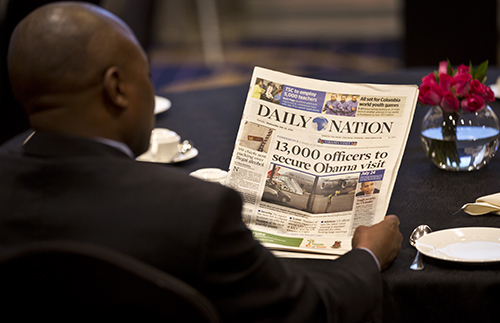
Gado blames government pressure as cartoonist’s contract at Kenya’s Nation ends
For 23 years Godfrey Mwampembwa has been a prominent and quick-witted observer of the political scene in East Africa. But all that changed last month when the cartoonist, known as Gado, was told his contract at Kenya’s biggest newspapers, the Nation, would not be renewed.
Kenyan journalist arrested
Kenyan police arrested journalist Elijah Kinyanjui Maina in the town of Nakuru, roughly 160 kilometres (99 miles) northwest of Nairobi, on January 12, 2016, and released him that evening, according to news reports. Maina is managing editor of the website Nakuru County News, which focuses on local news.
CPJ condemns detention of Kenyan journalist over protection of sources
Nairobi, November 10, 2015–The Committee to Protect Journalists condemns the arrest of John Ngirachu, the parliamentary editor of independent daily The Nation. Authorities arrested Ngirachu Tuesday evening and demanded that he reveal his sources for a report on alleged procurement irregularities by the interior ministry, journalists at The Nation and other Kenyan outlets told CPJ.…
Kenyan parliament passes repressive media bill
New York, October 15, 2015–The Committee to Protect Journalists condemns the passage late Wednesday by Kenya’s national assembly of a bill that would impose a harsh fine or two years in jail, or both, for a journalist who is found guilty of defaming the Kenyan parliament or its members. The bill must be approved by…

Mission Journal: Will Obama’s visit boost hopes for press freedom in Kenya?
President Barack Obama is expected to address a range of topics when he arrives in Kenya tomorrow. The Kenyan government says it plans to discuss security and trade, while opposition parties and civil society want good governance and human rights added to the agenda, according to news reports. We hope the discussion includes the commitments…
Kenya falls short on promises for press freedom
New CPJ report finds worsening climate for journalists in traditionally open Kenya New York, July 15, 2015–A combination of legal and physical harassment, as well as concentration in media ownership, makes it increasingly difficult for journalists to work freely in Kenya, according to “Broken promises: How Kenya is failing to uphold its commitment to a…
Broken promises
How Kenya is failing to uphold its commitment to a free press Kenya’s constitution guarantees freedom of the media, but President Uhuru Kenyatta’s Jubilee coalition has introduced several bills that undermine rather than enforce that principle. Journalists are vulnerable to legal harassment, threats, or attack, while news outlets are manipulated by advertisers or politician-owners. The…
Broken promises
Introduction On April 18, two journalists arrived near a state-owned ranch in Tana River County in southeast Kenya to investigate residents’ claims that local paramilitary police had impounded a large herd of cattle for allegedly trespassing and were demanding bribes to release the animals. Before the journalists got out of their car, about 15 officers…
Broken promises
1. How media ownership and advertising curb critical reporting Attempts to control the media in Kenya date back to at least 1929, with transmission of the first radio signal by the British East African Broadcasting Corporation, which served the interests of the colonial government. Throughout the country’s history, including independence in 1963 and the end…